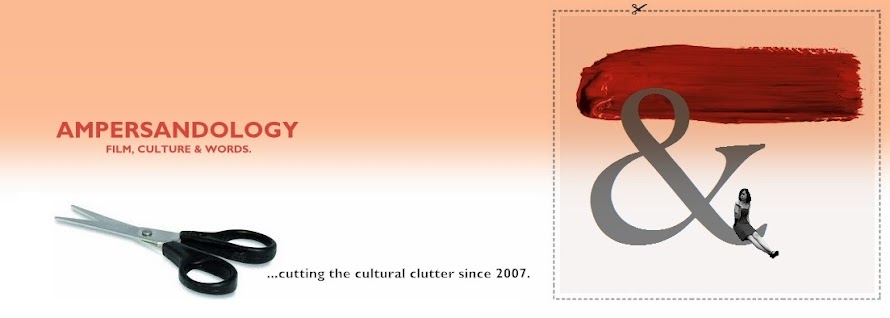by Jillian Butler, Ampersandology
I've long been saying the same thing, like a broken record with no self-awareness: that Steven Spielberg is more or less the greatest working director of all time.
Okay, okay, I know. It's not the obvious film buff choice. He lacks the unknowable, distant prestige of Fellini or Altman, or even the bizarre legacy of devotees like Kubrick. He's perhaps a little too populist to be a director's director. He's, for fear of overuse, an audience's director, a visionary who, horror of horrors, considers audience attachment to the images we see onscreen. And I think that's why his critics feel that Spielberg's success comes at the cost of style without substance; quite frankly, if you manage to dislike some of his more successful outings (Catch Me if You Can, are your ears burning?), then congrats. You're the first cyborg in world history! His films are tailor-made to appeal to the tiny child that still lives inside of you; he bypasses our adult selves and goes for the gut, showing us the things we loved when we didn't know any better. Dinosaurs! Aliens! Good guys with white hats and villains with black ones! Tidy endings for all!
But his commercial success isn't what impresses me most: it's his exhaustive versatility. He's worked in nearly every genre, had relatively few failed experiments, and manages to scare up healthy box office numbers even in these dark times. He's like the very best sessional musician: so annoyingly competent that you want to begrudge him such success but can't, because he's so earnest.
I think it bears repeating: Spielberg still love making movies. Still. His films vibrate with a genuine awe of the medium, and a desire to push it to new heights. Uncanny valley aside, you can't say that The Adventures of Tintin is giving us a carbon copy of previous experiments in CGI. He's exploring new territory with the verve of someone who hasn't realized that there are limits to the human experience. These are what Spielberg's films embody for me: a lack of awareness that there should, or needs to be, a separation of reality and fantasy. It's child-like, almost, and precious in these modern times.
To that end, I offer you two video essays that explore this legacy, one by longtime favorite critic Matt Zoller Seitz, and the other by new friend Kevin B. Lee. Lee's interrogation on the possibility of a 'Spielberg face' was a welcome little gift, featuring a particularly good reading of A.I's place in the canon.
Magic and Light: The Films of Steven Spielberg (CHAPTER ONE)
The Spielberg Face
Happy new year! I love starting fresh years with awesome cultural criticisms, don't you?
ps. Also, just for fun, here are the Indiana Jones segments. If you're pressed for time, just watch these. I never left behind my inner 12-year old. Neither should you.
I've long been saying the same thing, like a broken record with no self-awareness: that Steven Spielberg is more or less the greatest working director of all time.
Okay, okay, I know. It's not the obvious film buff choice. He lacks the unknowable, distant prestige of Fellini or Altman, or even the bizarre legacy of devotees like Kubrick. He's perhaps a little too populist to be a director's director. He's, for fear of overuse, an audience's director, a visionary who, horror of horrors, considers audience attachment to the images we see onscreen. And I think that's why his critics feel that Spielberg's success comes at the cost of style without substance; quite frankly, if you manage to dislike some of his more successful outings (Catch Me if You Can, are your ears burning?), then congrats. You're the first cyborg in world history! His films are tailor-made to appeal to the tiny child that still lives inside of you; he bypasses our adult selves and goes for the gut, showing us the things we loved when we didn't know any better. Dinosaurs! Aliens! Good guys with white hats and villains with black ones! Tidy endings for all!
But his commercial success isn't what impresses me most: it's his exhaustive versatility. He's worked in nearly every genre, had relatively few failed experiments, and manages to scare up healthy box office numbers even in these dark times. He's like the very best sessional musician: so annoyingly competent that you want to begrudge him such success but can't, because he's so earnest.
I think it bears repeating: Spielberg still love making movies. Still. His films vibrate with a genuine awe of the medium, and a desire to push it to new heights. Uncanny valley aside, you can't say that The Adventures of Tintin is giving us a carbon copy of previous experiments in CGI. He's exploring new territory with the verve of someone who hasn't realized that there are limits to the human experience. These are what Spielberg's films embody for me: a lack of awareness that there should, or needs to be, a separation of reality and fantasy. It's child-like, almost, and precious in these modern times.
To that end, I offer you two video essays that explore this legacy, one by longtime favorite critic Matt Zoller Seitz, and the other by new friend Kevin B. Lee. Lee's interrogation on the possibility of a 'Spielberg face' was a welcome little gift, featuring a particularly good reading of A.I's place in the canon.
Magic and Light: The Films of Steven Spielberg (CHAPTER ONE)
The Spielberg Face
Happy new year! I love starting fresh years with awesome cultural criticisms, don't you?
ps. Also, just for fun, here are the Indiana Jones segments. If you're pressed for time, just watch these. I never left behind my inner 12-year old. Neither should you.
Have a suggestion for a future Ampersandology topic? Got something
you’d like to say? All feedback welcome! Shoot us an email at ampersandology@gmail.com, or follow Ampersandology on Facebook.


No comments:
Post a Comment